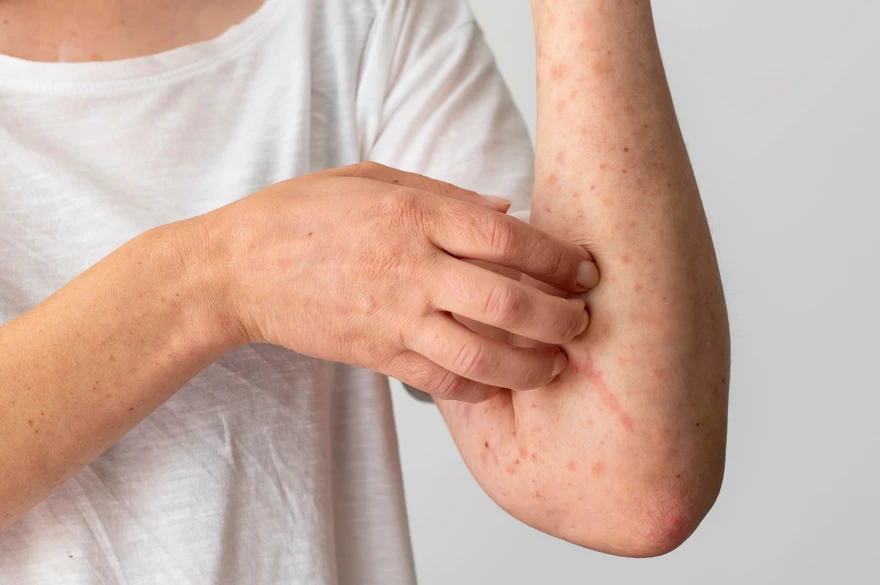IgE Total Test - Antibody
57+ booked in last 3 daysTotal IGE Test Overview
An allergy is a hypersensitivity disorder of the immune system that causes undesirable reactions to certain substances like food, dust, pollen, drugs or even animal dander. These reactions normally do not occur in others. The substance causing the reaction is an allergen. Immunoglobin E is an antibody that the body produces in case of an allergic reaction. A total IgE test is a blood test used to measure the IgE levels in the blood. It is used to find out if a person has developed an allergy.
Written by: Dr.Shibani R, Medical Writer, Medical Affairs
IgE Total Test - Antibody Price
Metropolis Healthcare is a leading diagnostics centre and pathology lab in India equipped with the latest state-of-the-art technologies that provides the IgE Total Test - Antibody with a clear pricing structure.
The IgE Total Test - Antibody Price in Mumbai is ₹ 1,200 .
We are committed to deliver accurate and quality results from the best labs in India with complete transparency regarding test cost and turnaround time. No matter where you are, we strive to offer patients high-quality service that is affordable and accessible.
Frequently Asked Questions
Total IgE test is done in cases of :
- Suspected allergies. Common symptoms are: Itching, running nose, sneezing, coughing, diarrhoea, hives
- Suspected parasitic or fungal infections
- Certain autoimmune disorders
The IgE Total Antibody Serum Test measures the total amount of immunoglobulin E (IgE) antibodies in your blood. IgE is an antibody type involved in allergic reactions.
Total IgE test requires a blood sample. A tourniquet (elastic) band is placed tightly on the upper arm. The patient is then asked to make a fist. This helps in the build-up of blood filling the veins. The skin is disinfected before needle insertion and the blood sample is collected in vacutainer.
Generally, IgE is found in very small traces in the blood. Elevated levels of IgE can mean that a person has some kind of allergy. An increase in IgE levels can be due to the following reasons:
- Allergic conditions such as asthma, urticaria, allergic rhinitis, and atopic dermatitis.
- Food allergy.
- Blood-related cancers.
- Infections such as parasitic infection, HIV, tuberculosis, etc.
In contrast, low levels of IgE indicate autoimmune diseases.
However, this particular test does not pinpoint which specific allergen has caused the allergy. For further diagnosis, the healthcare provider may recommend a specific IgE test.
Allergy can be caused due to various reasons. These could be bacteria, viruses, food, medications, dust, pollen, animal dander, etc.
There is no special preparation for the IgE total antibody serum test. However, it's crucial to inform your doctor about any medications you're taking, particularly antihistamines, as they can sometimes affect the test results. Discuss any questions or concerns you have with your doctor before the test for a smooth experience.
The IgE total antibody serum test requires a blood sample. An elastic band is placed on the upper arm. After which, a person should make a fist. This is for blood to build up in the veins. The skin is disinfected. Then the needle is inserted into the skin. A small amount of blood is drawn. It is collected in a vial. This blood is then sent to a laboratory for diagnosis.
There is no serious risk with the IgE total antibody serum test. A person may experience a slight swelling, pain or very light bleeding at the site of needle insertion to draw the blood sample.
The IgE total antibody serum test is a good initial screening tool for allergies. However, it can't pinpoint the exact cause of the elevated IgE. A high IgE level could indicate allergies, parasites, or even other immune system issues. Therefore, the IgE test is often used alongside other tests or a patient's medical history for a more complete picture. If the IgE test is high, further investigation with specific allergy tests or parasite examinations might be needed for a confirmed diagnosis.
Yes, stress increases allergy. During stress, the body releases certain chemicals such as histamines. These cause allergic symptoms. However, stress does not cause allergies but can worsen the already existing allergic condition.
- Allergy Blood Test
- Total Immunoglobulin E (IgE) Antibody Test
- IgE Allergy Test
An allergy is a hypersensitive disorder. It is caused by the immune system on exposure to allergens such as viruses and bacteria. This makes a person fall sick. However, the immune system may consider a few harmless foreign substances as a threat. These could be pollens, dust, animal dander, certain food and medications, etc. It initiates a defence mechanism against them to protect the body. During this, the immune system produces a protein called immunoglobulin E (IgE) antibodies. This antibody binds with an antigen. This triggers the other cells in the body to fight the invading antigen. As a result, a person may experience allergic symptoms.
Your healthcare provider may recommend the IgE total antibody serum test if you have the following allergic symptoms:
- Itchy or watery eyes
- Stuffed and runny nose
- Cough
- Diarrhoea
- Vomiting
- Skin rash
- Red patches on the skin
- Wheezing
- Shortness of breath
Generally, the symptoms are mild. However, in certain cases, the symptoms may turn out to be severe and life-threatening. It is ideal to consult the doctor at the earliest. One should not neglect the symptoms.
Ratings & Reviews (0)
Why Metropolis?
Metropolis has a team of 200 senior pathologists and over 2000 technicians delivering diagnostic solutions in the areas of routine, semi specialty and super specialty domains like Oncology, Neurology, Gynaecology, Nephrology and many more.
We offer a comprehensive range of 4000+ clinical laboratory tests and profiles, which are used for prediction, early detection, diagnostic screening, confirmation and/or monitoring of the disease.



.png)

















 WhatsApp
WhatsApp